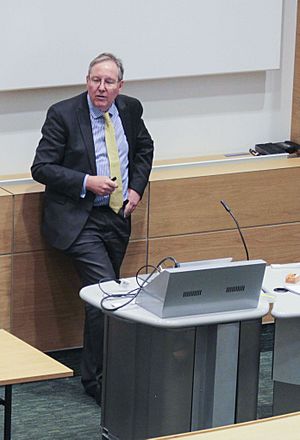Peter Littlewood facts for kids
Quick facts for kids
Peter Littlewood
|
|
|---|---|
 |
|
| Born | May 18, 1955 |
| Nationality | British |
| Alma mater | University of Cambridge |
| Known for | polariton condensation, correlated oxides |
| Scientific career | |
| Fields | Condensed matter physics |
| Institutions | |
| Doctoral advisor | Volker Heine |
| Notable students |
|
Peter Brent Littlewood is a famous British physicist born on May 18, 1955. He is a Professor of Physics at the University of Chicago. He used to be the Director of Argonne National Laboratory, which is a big science research center. Before that, he led important science groups at places like the Cavendish Laboratory and Bell Laboratories. Peter Littlewood is also a Fellow of the Royal Society, which is a very special honor for scientists.
Peter Littlewood's Journey in Science
Peter Littlewood has had an exciting career in the world of physics. He has worked at many top research places and universities.
Early Education and Research
Peter Littlewood studied Natural Sciences at the University of Cambridge in 1976. He then went to the Massachusetts Institute of Technology (MIT) in the United States for two years. After that, he returned to Cambridge to earn his PhD, which is a high-level university degree.
Working at Bell Labs
In 1980, Peter Littlewood started working at Bell Labs. This was a famous research center where many important inventions were made. He became the head of the theoretical physics research group there in 1992. He continued to work at Bell Labs until 2001.
Leading Research at Universities
In 1997, he became a professor at the Cavendish Laboratory in Cambridge. He led the Theory of Condensed Matter group, which studies how materials behave. He also spent time as a Matthias Scholar at Los Alamos National Laboratory in 2003-2004.
In 2005, he returned to Cambridge to become the head of the entire Cavendish Laboratory. This is a very important role, as the Cavendish Laboratory is known for many scientific discoveries.
Directing Argonne National Laboratory
In 2011, Peter Littlewood moved to the Argonne National Laboratory in the United States. He became the Associate Laboratory Director for Physical Sciences and Engineering. Then, in March 2014, he was chosen to be the Director of the entire laboratory. He retired from this role in January 2017 to focus on his research at the University of Chicago. Since 2022, he also works part-time at the University of St Andrews in Scotland.
Peter Littlewood has also given advice to other science organizations, like the Faraday Institute and Flatiron Institute. He holds six patents, which means he invented things that are protected by law. He has also written over 200 articles for scientific journals and given more than 200 talks at science conferences around the world.
Special Honors and Awards
Peter Littlewood has received many honors for his important work:
- He became a Fellow of the Royal Society of London in 2007.
- He was named a Fellow of the Institute of Physics in 2005.
- He became a Fellow of the American Physical Society in 1989.
- He was a Kennedy Scholar at MIT in 1976–77.
Peter Littlewood's Scientific Discoveries
Peter Littlewood's research focuses on understanding how different materials work, especially at a very small level.
Studying Materials and Their Properties
He has studied materials like superconductors, which can carry electricity with no loss of energy. He also researches transition metal oxides and other materials where electrons behave in interesting ways. He looks at how light interacts with special semiconductors.
Applying Science to New Technologies
His work isn't just about understanding; it's also about making new things. He has applied his scientific methods to engineering. This includes areas like holographic storage, which is a way to store lots of information using light. He also works on optical fibers and devices, which are used in communication, and new materials for particle detectors, which help scientists study tiny particles.
 | Aaron Henry |
 | T. R. M. Howard |
 | Jesse Jackson |

